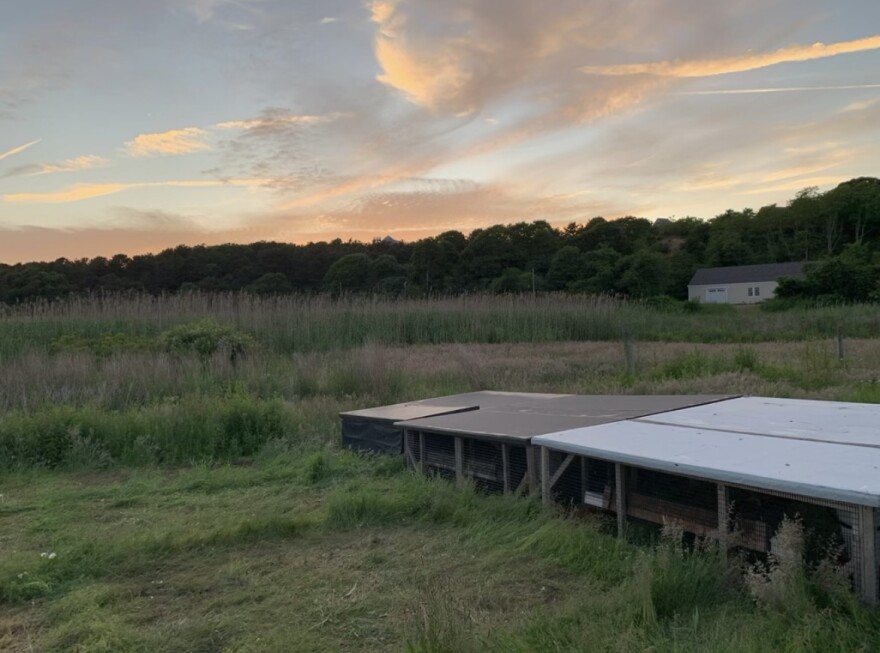Drew Locke raises pastured poultry in Truro. Every year between April and November he raises between 600 and 900 birds to sell to local customers at farmers markets, through his family’s farm stand, and wholesale. Normally, he processes all these birds himself.
"It all started with my processing license, where that license, I’m only allowed to do whole chickens," explains Drew.
Drew is licensed through the state of Massachusetts and usually processes in what’s called a mobile poultry processing unit. These units came on the scene around 2011—there weren’t any traditional USDA certified slaughter houses for poultry in Massachusetts at the time, and the start up cost of about a million dollars proved too much for most small growers. So mobile slaughterhouses were developed to allow small farmers to share this resource — you can actually hook them up to a truck and drive them to your farm.
"The unit that I use is owned by Tufts Medical School and it was grant funded and when I first got into the game 12 years ago there was like 30 farms that wanted to use the unit and now, 2019 to now, it’s just been me using the unit."
There are likely a variety of reasons for this, but Drew says mostly, he thinks it’s because even though it’s more expensive to bring your birds to a processor out of state, in some ways, it’s easier. He normally processes between 35 and 70 birds a week with his brother.
"You know, we have nine cones on a wall, put ‘em in there, hit the jugular. And then, once the ninth one’s down, you can pretty much assume or guarantee that the first four are dead then. So you take four, put em on a scalder, then you check a pin feather, make sure it comes out clean, and then you get the plucker ready. From there the person on the other side, feet and heads off, in chill tanks."

Both brothers are doing this in the late afternoon, after a full day of work. Once the chickens are in the chill tank, it takes at least an hour to clean up the cones, the scalder, and the plucker before Drew and his brother can start eviscerating the chickens, which takes about three hours for seventy birds.
"But then the funny part is that packing the chickens takes just as long as this entire process because you’ve gotta put em on the dry rack, then you’ve gotta put a bag over them, then you’ve gotta seal em up, then you’ve gotta put a tag on them, then you gotta get em in the cooler, then you gotta get them to the freezer if you’re going to freeze them, then you’ve gotta figure out your orders."
Recently, Drew has been forced to stop using the mobile poultry processing unit at his farm, because the state got behind on inspections during COVID. So while he waits he’s taking his birds to a poultry processer off Cape, a place called Baffoni’s in Rhode Island. He leaves around five am with the chickens in crates, drives a couple hours, and unloads.
"Some people just stand there and let them do it but I help put my slicks on and I help them load the chickens and you wait for your crates to come back so they kill all your birds and then you get your crates back and then most people go home and do their farm chores and then come back at like four o clock and pick up."
Drew stays and helps, because it’s too far for him to drive home. But it’s more expensive — it costs four dollars and seventy five cents per bird to have them slaughtered, and an extra 25 cents for a stamp with the bird’s weight on it. There’s also the option to get the birds broken down into cuts like wings and thighs, something Drew isn’t allowed to do in the mobile poultry processing unit — though this costs even more.
"But it’s really convenient, you know you pay a price but you literally can just drop them off and come back and your bird is packaged with a stamp on it."
Drew doesn’t love slaughter day — in fact, he says it’s his least favorite day of the week. But once the state gets inspections up and going again, he wants to keep processing his own birds, on his own farm. There’s something tempting about bringing the birds to a one stop shop, and the mobile poultry processing unit isn’t a perfect solution. But for now, for a farm his size, it is a way to keep costs down and to keep the work of the family on the farm
—
Find more about mobile poultry slaughterhouse here:
https://www.storey.com/article/ali-berlow-portrait-that-makes-mama/








